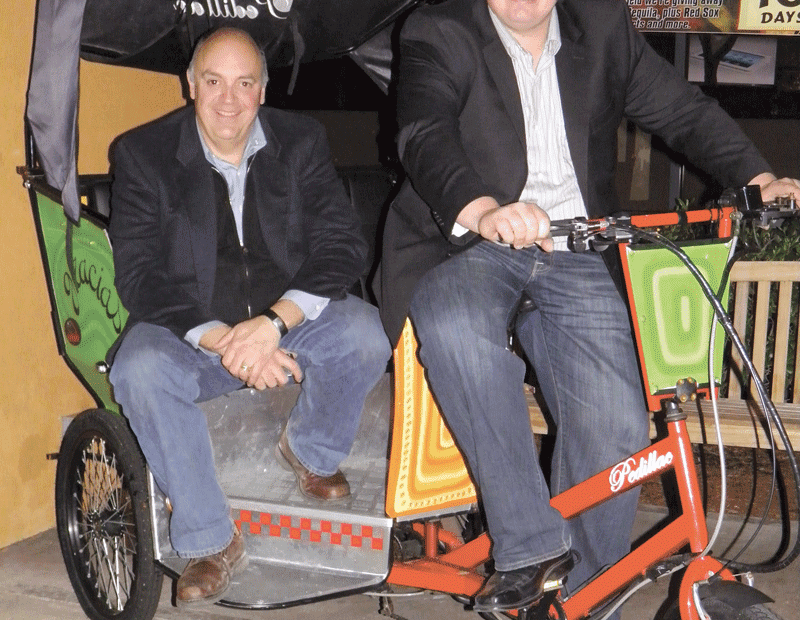
A Mexican Adventure
Mama Iguana’s Was Designed to Create Memorable Experiences
Talk about fun.In fact, that’s exactly what Claudio Guerra did as he described how and why he created Mama Iguana’s in Springfield just north of the Basketball Hall of Fame. The Mexican restaurant, which opened last June, is a much larger version of the Northampton eatery with the same name and has been so successful, there was standing room only on the patio all last summer.
Hand-painted pieces of original Mexican artwork in vivid colors surround a large, gleaming rectangular bar in the semi-enclosed outdoor spot that seats 100 and has an adjacent dining area where the mood is lively, thanks in part to lights in a rainbow of bright hues.
The fun-filled atmosphere that Guerra created continues inside the three-story restaurant, which was designed to embody the spirit that is at the heart and soul of the six other eateries he owns. “We really try. It doesn’t happen by accident — it’s a labor of love,” Guerra said as he talked to BusinessWest about a lifetime spent in the restaurant business, which began when he was about 10 years old and worked as a coat checker in his father’s Long Island eatery.
Over the course of several hours, Guerra unveiled the secrets of his past and present success. The journey hasn’t always been easy, and when the recession hit in 2008, he had to reinvent the way he did business. But laughter and openness are givens for him, as he enjoys life, truly loves fun, and is always on the hunt for a new spot to open another restaurant.
In addition to owning and operating Mama Iguana’s in Springfield and Northampton, Guerra owns Spoleto’s in Northampton and East Longmeadow and the Paradise City Tavern, Pizzeria Paradiso, and Spoleto’s Express, all in Northampton.
Although they encompass different moods, Mama Iguana’s was designed “to be super-casual for super fun. It has the right price and environment for today’s economic reality and is a place where people can feel comfortable and relax,” Guerra said.
It boasts the largest selection of tequila brands in the Northeast, and more than 200 bottles of high-quality, 100% blue agave sit behind the bar. Many come from small microbreweries Guerra discovered in Mexico, and people can join a Tequila Club, which allows them to keep track of the varieties they have tried; attend sessions of the resaurant’s Tequila University, which features owners or speakers from the breweries; and/or make reservations for tequila dinners, with a menu of foods matched with appropriate tequilas.
Guerra did a major renovation of the the interior and exterior of the former home of Onyx Fusion Bar and Restaurant (the old Basketball Hall of Fame). He felt it lacked warmth, so he spent countless hours and a significant amount of money changing the lighting to make the space more intimate; it now includes enormous, wrought-iron candelabras. He also brought artists in from Mexico and California to create original works that include panels, papier-mâché sculptures, and paintings to insure it had an authentic atmosphere.
Oversized imitation skeleton heads also abound. They reflect the Mexican Day of the Dead celebration held to honor deceased relatives, and include two skeleton figures seated on a full-size motorcyles across from the stairwell between the first and second floors.
Guerra also did away with the TV screens behind the bar (although major sporting events are still broadcast on a large pull-down screen) and replaced it with “fun artwork.” Many pieces were purchased on shopping expeditions in Mexico, including the head of an angel, which weighs about 150 pounds and is almost six feet in height.
Guerra points out a large wall mural painted by an artist he brought in from San Francisco. It’s a replica of a carving from Mayan ruins, and has four gods seated in a canoe with a day and night paddler, meant to represent the cycle of life.
“When people walk in, they know this is not a chain,” he said, adding that the three floors of the building often accommodate entirely different types of parties.
“We can have a bachelorette party on one floor, a doctor’s convention on another, and a sporting event on the main floor,” said Bill Collins, director of Operations. “We turned this into a place that is beautiful and festive and took advantage of its great infrastructure.”
Dedicated Commitment
However, it takes far more than lively décor to make an eatery a success, and Guerra has a recipe with many ingredients.
The most critical — along with exceptional food and atmosphere — is the way the customer is treated. “I haven’t met a person who hasn’t had the experience of walking into a restaurant and being seated at a less-than-desirable table when other tables were available,” Guerra said.
It’s something he won’t stand for, and says he does not believe in seating people so the wait staff have the opportunity to serve approximately the same number of clients. Instead, he rotates their shifts between the most popular tables, and says it is up to them to ask co-workers for help if it’s needed. “My philosophy is all about accomodating the customer, and they should always be seated at the best possible table,” he said. “We understand the art of pleasing people.”
Since he believes the philosophy and resulting behavior in any business must come from the top, he plays an active role in demonstating the principle. Recently a little girl seated with her family of six asked him if she could order a glass of Orangina. He told her they didn’t have it, but asked her to “hold on” for a few minutes. “I ran to the nearest store and bought a bottle. I enjoy doing fun things for people.”
Although he acknowledges it’s not possible to accommodate every request, “on any given night at Spoleto’s we are cooking dishes we haven’t had on the menu for 20 years because a customer asked for them,” he said.
Everyone who works for Guerra is schooled in the belief that it is their job to make the customer feel welcome. He says the difference between a memorable experience and one that leaves a person unsatisfied occurs the moment they are greeted at the door.
“When a person walks in and looks at the waitperson, the experience is won or lost in a millisecond according to whether the person looks miserable or cheerful,” he said. “I have spent my life studying the way a person approaches a table. It’s part of the social structure of a good restaurant, and although anyone can learn to serve food, not everyone has the ability to make people feel welcome.”
Guerra says he has wait staff who have worked for him for 10 years and never had a complaint. “It’s not because they didn’t make mistakes, which is especially true for a high-pressure hosting position,” he said. “You can tell the customer there is a 45-minute wait in a way that will make them laugh. But it’s an art. The science is at the back of the house.”
That’s where the food is prepared, and every night the Mexican moles, salsa, and other sauces at Mama Iguana’s are tasted by the chef, cook, manager, and Collins when he is on site before they are served. Guerra says the word ‘mole’ means to chop, and every village in Mexico has their own version of the sauce.
“Our moles are the heart of our kitchen and have incredibly complex flavors with at least 25 ingredients, which can includes seeds, nuts, and dried peppers,” he said. They are used in a variety of ways, and a dish called Holy Mole with pulled chicken, pork, and sautéed vegetables is topped with three mole sauces. The menu is Tex-Mex, and prices average between $10 and $14 for an entrée.
Business Lesson
Guerra was born in Germany and immigrated to the U.S at age 3 with his family. His father found work as a waiter in New York City before opening a French eatery on Long Island. A short time later, his mother opened a German restaurant, and then his parents opened an Italian restaurant together.
Guerra was always in the restaurants, and graduated from checking coats to busing tables to dishwashing and eventually cooking. After graduating from high school, he served as an apprentice to a cook in an elite French restaurant in Europe. When he returned, his father opened the Mill on the River restaurant in South Windsor, Conn., and one day when they were driving around, “we stumbled onto Northampton. Before I even got out of the car, I looked around and knew, ‘this was it,’” Guerra said.
He opened Spoleto’s there 25 years ago and said it was a success from the start. “My formula has always been simple. Treat your customers and employees the way you would want to be treated.”
Guerra continued to open new eateries, including the upscale French restauarant, Del Raye, which he turned into a pub in 2008, and they all did well until the recession hit. He had opened another Spoleto’s in East Longmeadow as well as the Northampton Mama Iguana’s in 2007, and the downturn in the economy affected business across the board. “It was extremely tough. We were struggling to survive,” he said.
During that time, a consulting company contacted him and offered to conduct a free, in-depth analysis of his restaurants. Although Guerra didn’t hire the firm to make changes, the exercise did point out a number of areas that needed improvement. “So we rolled up our sleeves and concentrated on the nuts and bolts of our predicament,” he said.
And although the Springfield Mama Iguana’s did well, the restaurant group as a whole continued to struggle to turn the numbers around until the beginning of this year, “when the lights went on and we opened our eyes.”
Guerra said he finally realized he had too much invested in liquor and food. He reduced the inventory at his restaurants by 35% and began holding weekly meetings with all of his managers. In addition, every chef and manager was given a budget and had to do a weekly cost analysis.
“I never had to think about these things before. It was very painful, but now that the systems are in place, there have been some wonderful surprises; the managers are working harder, and the employees are energized. We have given them the tools and knowledge of how to do their jobs better,” he explained, comparing the way they operated in the past to a football team with great players but without a game plan. Now, everyone is informed about the plan, and all is going well.
Guerra said he’s happy he opened Mama Iguana’s in Springfield. “It’s a great market with high visibility. People want to be able to go out to a fun environment and not spend a lot, and Mexican cuisine allows you to do that.”
Recipe for Success
Many families and businesses hold parties and meetings at Mama Iguana’s. The third floor has pull-down screens that can be used for business presentations and is a quiet spot for those who seek that atmosphere, while the other floors are more lively.
And when guests leave, they don’t have to worry about how far away they parked because a cyclist sits outside, waiting to give them a ride to their vehicle in the restaurant’s pedicab.
It’s all part of the fun, and Guerra continues to do all he can to ensure that people will have positive experiences when they visit. To him, business is about making sure the customer has — what else? — fun, along with positive memories and, in this case, a great Mexican adventure in his Mama Iguana style.





